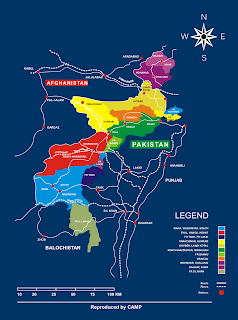We see this happening.
Under the heading of "Pakistan's Fight with the Taliban" at The Economist, we have the following article: The crumbling centre: Pakistan's religious mainstream makes common cause with militants:
THE assassination on January 4th of Salman Taseer by Malik Mumtaz Qadri, a commando in his security detail, contained a chilling message: the Barelvi sect of Islam has become a militant new force in Pakistani politics. Most Pakistanis are Barelvis. They have traditionally disavowed violence, followed the peaceful Sufi traditions of the subcontinent, and paid homage to scores of saints, big and small, at tombs across the country.
Mr Qadri is also a Barelvi. But when he determined to “punish” Mr Taseer for supposedly committing blasphemy—the governor of Punjab province had campaigned against Pakistan’s blasphemy law—Mr Qadri seems to have been influenced by the rise of firebrand Barelvi mullahs calling for all blasphemers (on their definition) to be killed. After Mr Qadri’s arrest, Barelvis marched in their thousands, along with co-religionists of other sects, parties and persuasions, shouting “death to blasphemers”. Lawyers showered rose petals on the murderer, and the policemen guarding him have uploaded approving videos of him on YouTube. A full-blown, all-party religious revival has erupted, a disturbing turn for both state and society.
Let's just be clear about this: the sky isn't falling. But, any pretense of secularism in Pakistan is falling, and if it should fall completely, it will be replaced with Islamic militant extremism.
The main underlying problem is Islam. Anyone who reads Islamic texts close enough realizes that peaceful, "moderate" Muslims are not true Muslims, as the word and deed of the prophet, Mohammed, point the way toward violence - merciless, and often sadistic. Muslims who are "moderate" are apostates by the standards of the rest, and ongoing events call attention to the differences which, in turn, call attention back to Islamic scriptures.
The Taliban — who hail from the hardline Deobandi sect of Islam, close to the Wahhabism espoused by Osama bin Laden — have stoked the mainstream resurgence. Facing defeat by Pakistan's army in the tribal areas of the north-west, the Taliban struck urban targets, including police stations and the army's general headquarters. When the government persuaded Barelvi mullahs to condemn suicide-bombings as "unIslamic", the Taliban assassinated them and bombed their mosques and Sufi shrines.
Wahhabism comes from Saudi Arabia. In fact, the House of Saud made a deal with Wahhab to promote his version of Islam - a "Deal with the Devil". A key idea of Wahhabism is that Muslims who aren't "Muslim" enough are takfir; like infidels who refuse to submit, they can be killed and their possessions taken.
To be fair, many mainstream Muslims would refer to such extremists as khawarij, but, in a way, that just makes takfir out of the extremists; would turnabout be fair play?
Finishing The crumbling centre: Pakistan's religious mainstream makes common cause with militants:
Yet the trauma has made the Barelvi leaders more militant, not less. The anti-blasphemy bandwagon makes common cause with the Taliban. Other groups have sensed an opportunity for an Islamic political revival, including non-Taliban Deobandi and Wahhabi groups. Two such groupings play a critical role in Pakistani politics.
The Jamiat i Ulema e Islam (JUI), a Deobandi outfit, is led by a pragmatist, Maulana Fazal ur Rehman. The JUI contests elections in the tribal areas, and is a coalition partner of the ruling Pakistan People's Party. But Mr Rehman must heed hardliners inclined to abandon parliamentary politics and switch loyalties to the Taliban. So the JUI is against the "war on terror" because it is an "American" war. It has also condemned Mr Taseer.
The other grouping represents Lashkar-e-Taiba, notorious anti-India jihadists. The organisation is banned, but "charities" front for it. Both groupings hate America, retain close links with the ISI, Pakistan's powerful military intelligence agency, and detect Western plots behind Mr Taseer's campaign to amend the blasphemy laws.
Anti-American sentiment, in turn, provides the excuse for the government and army not to do more against the havens in North Waziristan of the Taliban, al-Qaeda and Taliban associates in the Haqqani network. The army says that, apart from being stretched by having to hold former Taliban areas and to defend its border with India, it cannot go into Waziristan without full public backing. This week America's vice-president, Joe Biden, was in the capital, Islamabad, urging action. Pointing to a rising tide of anti-American passion, the government and army appear to have shrugged their shoulders.
The US needs to back out of this some. Pakistanis need to decide what kind of country they want. If they decide they want an extremist Islamic state, then the infidel world might just have to destroy such a country in self-defense.
It should be noted that there are many, many good people in Pakistan who are more at risk from Islamic militancy than even we are - and not just the Christian minorities. But, unless they can take control of their country, they will be politically irrelevant; it should be recalled that there were many good people in Russia, Italy and Germany when the communists, fascists and Nazis took over, and the ineffectiveness of those good people helped lead to the destruction of those nations.
This point brings me to an important question:
What is Pakistan, really?
Stay tuned!





No comments:
Post a Comment